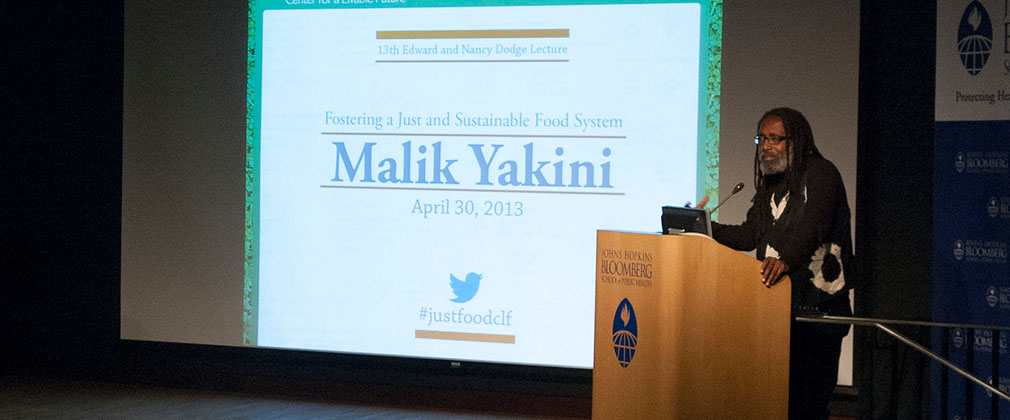Growing Justice (in Democracy-Deprived Detroit)
Last week, Malik Yakini hailed the Bloomberg School with greetings from Detroit, “where democracy has been put into a deep coma.” Lamenting the governor’s appointment of an emergency manager, which eviscerates the authority of elected officials in the city, he segued into a lambast of capitalism and how it deprives entire classes of Americans access to “good, clean, healthy food.”
“The food system in this country produces food that’s harmful to humans and the environment,” he said. There are no longer any national chain supermarkets in Detroit, one factor leading to food desertification in the city. The poor, he said, become markets for cheap inferior goods sold by the rich, much like in colonized lands. And the problem of capitalism is that it is a beast to be fed, always needing to expand. “Now capitalism is expanding into the commons,” he said, “to public schools and public lands. Those things are being taken over by private forces.”
Solving the food system crisis in this country will take efforts on many fronts. Food justice requires social justice. Yakini, the founder and executive director of the Detroit Black Community Food Security Network, emphasizes the need to work on the root causes of hunger, poverty, oppression, to work on the issue of police brutality, and to advocate for prison reform—just a few issues that factor into food injustice.
Here are four video clips in which Yakini expounds.
Stop playing the missionary. If you want to work in a community, enter as a partner. (video)
Black people don’t think much of farming. (Slavery, sharecropping, tenant farming: need we say more?) But we must re-frame farming as a noble profession and an act of self-determination. (video)
White supremacy—touchy subject. Here’s how Malik Yakini has learned to talk about it over the years. (video)
In the words of soul artist Donny Hathaway, “Everything is everything.” Here’s how Malik Yakini tries to connect all the parts of his life. (video)
Stop playing the missionary. If you want to work in a community, enter as a partner.
African-Americans don’t think much of farming. (Slavery, sharecropping, tenant farming: need we say more?) But we must re-frame farming as a noble profession and an act of self-determination.
White supremacy—it can be a touchy subject. Here’s how Malik Yakini has learned to talk about it over the years.
In the words of soul artist Donny Hathaway, “Everything is everything.” Here’s how Malik Yakini tries to connect all the parts of his life.
